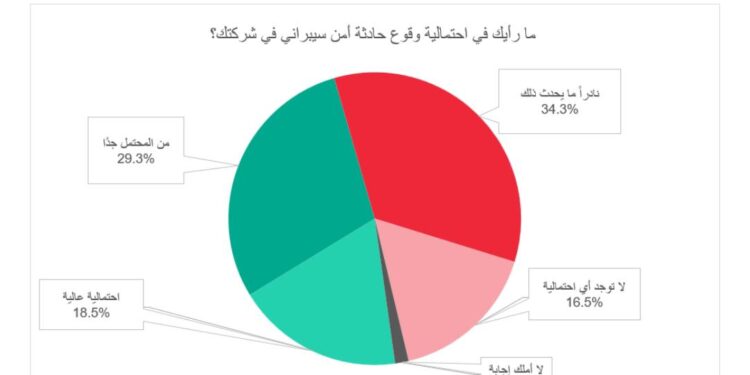استطلاع كاسبرسكي يكشف مدى احتمالية تعرّض المؤسسات لهجمات سيبرانية في مصر
القاهرة ، مصر – 30 يوليو 2025
أحد الأسباب الرئيسية التي تجعل الشركات لا تزال عرضة للتهديدات السيبرانية هو أنها تقلل من تقدير المخاطر التي تواجهها أو تُفرط في الثقة بفعالية دفاعاتها الحالية.
ووفقًا لاستبيان حديث أجرته كاسبرسكي بعنوان “الأمن السيبراني في مكان العمل: معرفة الموظف وسلوكه”، فإن%47,8 من المهنيين في مصر، الذين تتطلب أعمالهم استخدام الحواسيب، يتوقعون أن حدوث هجوم سيبراني على شركاتهم ليس مستبعدًا.
وعن تأثيرات الحوادث السيبرانية المحتملة، افترض 47,3% من الموظفين الذين شملهم الاستطلاع أن مثل هذه الحوادث قد تؤثر بشكل خطير على الشركة.
ويرجع هذا الوعي بالمخاطر ليس فقط إلى المعرفة العامة بالأمن السيبراني، بل أيضًا إلى معرفتهم المباشرة بوقوع حوادث سيبرانية في مؤسساتهم: حيث أقرّ 41%من المشاركين بوقوع حوادث من هذا النوع خلال الـ12 شهرًا الماضية، بينما أشار 24.3% آخرون إلى أنهم سمعوا عن هذه الحوادث من زملائهم في العمل.
وتواجه المؤسسات اليوم مجموعة متنوعة من التهديدات السيبرانية، بدءًا من التصيّد الاحتيالي والاحتيال عبر البريد الإلكتروني ووصولًا إلى هجمات الفدية والتهديدات المستمرة المتقدمة.
وفي كثير من هذه الهجمات، يتم استغلال خطأ بشري كنقطة دخول إلى شبكة المؤسسة، ولهذا السبب يعتمد المهاجمون بشكل متزايد على تقنيات الهندسة الاجتماعية وأدوات الذكاء الاصطناعي لجعل هجماتهم أكثر فعالية.
ويُظهر الاستطلاع أن معظم المشاركين يرون أن مسؤولية الأمن السيبراني تقع على عاتق قسم تكنولوجيا المعلومات، بينما ذكر 40% من المشاركين أن الإدارة العليا يجب أن تكون معنية أيضًا، وأشار 22% إلى أن موظفي الشؤون القانونية والمالية هم من الفئات الأساسية التي ينبغي أن تضع الأمن السيبراني في الاعتبار.
ومع ذلك، فقط 22,8% من الموظفين رأوا أن الأمن السيبراني هو مسؤولية مشتركة ينبغي أن يتحملها جميع الموظفين عبر المؤسسة بالكامل.
وقال توفيق ديرباس، المدير التنفيذي لكاسبرسكي في منطقة الشرق الأوسط وتركيا وإفريقيا: “مع تسارع التحول الرقمي في الوقت الحاضر ، يُعدّ الأمن السيبراني مسؤولية جماعية تتجاوز حدود قسم تكنولوجيا المعلومات. يجب على كل موظف أن يبقى متيقظًا أمام التهديدات المتطورة. ويُعد التدريب المنتظم، واستخدام الحلول التقنية المناسبة، وتطبيق السياسات الواضحة، ووضع خطة للاستجابة للحوادث من الركائز الأساسية لتعزيز مرونة المؤسسات في مواجهة التهديدات السيبرانية.
أضاف : ندما يكون كل فرد في الفريق مطلعًا ومستعدًا، تصبح المؤسسة أكثر صلابة في مواجهة هذه التهديدات.
ولمساعدة المؤسسات على تعزيز دفاعاتها السيبرانية، توصي كاسبرسكي بالتالي:
• تثقيف الموظفين وتدريبهم على الأمن السيبراني، نظرًا لأن الأخطاء البشرية من الأسباب الشائعة للانتهاكات. يمكن لحلول مثلKaspersky Automated Security Awareness Platform المساعدة في تطوير مهارات عملية مثل التعرف على رسائل التصيد والروابط المشبوهة.
• رفع كفاءة فرق الأمن السيبراني من خلال التدريبات الإلكترونية المتقدمة من كاسبرسكي، واستخدام Kaspersky Threat Intelligence كما تتيحKaspersky Digital Footprint Intelligence مراقبة التهديدات الخارجية التي تستهدف أصول الشركة، ما يعزز الحماية ضد تسريبات بيانات الاعتماد.
• تطبيق حلول أمنية قوية وأنظمة مراقبة، مثل تلك الموجودة في مجموعة منتجات Kaspersky Next.
• إنشاء نسخ احتياطية غير متصلة بالإنترنت لا يمكن للمهاجمين الوصول إليها، مع التأكد من إمكانية استعادتها بسرعة عند الطوارئ.
• تطبيق سياسات أمنية واضحة للموظفين، تشمل كلمات المرور، وسياسات تثبيت البرمجيات، وتقسيم الشبكات.
• تعزيز ثقافة الأمن داخل المؤسسة: شجّع الموظفين على الإبلاغ عن الأنشطة المشبوهة دون الخوف من اللوم، وكافئ السلوكيات الأمنية الإيجابية، مثل الأداء الجيد في محاكاة التصيّد الاحتيالي.
وقد تم إجراء هذا الاستطلاع من قبل وكالة الأبحاث “Toluna” بتكليف من كاسبرسكي في عام 2025، وشمل عينة من 2800 مقابلة إلكترونية مع موظفين وأصحاب أعمال يستخدمون الحواسيب في عملهم، في سبع دول: تركيا، جنوب أفريقيا، كينيا، باكستان، مصر، السعودية، والإمارات.
of the core reasons why businesses remain vulnerable to cyberthreats is that they underestimate their risk or overestimate the strength of their existing defences. According to a recent Kaspersky survey entitled “Cybersecurity in the workplace: Employee knowledge and behavior”, 47,8% of professionals surveyed in Egypt, whose work requires the use of computers, asses the risk of a cybersecurity incident happening to their company as quite possible.
Commenting on the probable consequences of a cybersecurity incident, 47,3% of employees surveyed supposed that it might seriously affect the company. This understanding of risks comes not only from general cybersecurity awareness, but also from knowledge about cyber incidents in their organizations: 41% of respondents acknowledged such incidents happened in the past 12-months, while an additional 24,3% said they have heard about these incidents from colleagues.
Organizations nowadays face a variety of cyberthreats ranging from phishing and business email compromise to ransomware and advanced persistent threats. In a lot of these attacks, the entry point into the organization’s network is via a human mistake, and it is for that reason attackers actively employ social engineering techniques and AI tools to make their efforts more effective.
The survey shows that the majority of respondents understand that cybersecurity is an issue that should be considered by the IT department, while 40% also mentioned top level executives and 22% cited legal and financial employees as core groups within the business who should keep cybersecurity issues in mind. Only 22,8% of employees surveyed viewed cybersecurity as an issue that should be considered by all employees across the entire business.
“In today’s digital landscape, cybersecurity is a collective responsibility that extends beyond the IT department. Every employee should remain vigilant against evolving threats. Regular cybersecurity training, use of relevant IT solutions, well-defined policies and an incident response plan are essential pillars of organizational cyber resilience. When every team member is informed and prepared, the organization stands stronger against cyber threats,” says Toufic Derbass, Managing Director for the META region at Kaspersky.
To help organizations strengthen their defenses, Kaspersky recommends the following:
• Employee education and cybersecurity training is necessary as human error is a common cause for cybersecurity breaches. Solutions such as Kaspersky Automated Security Awareness Platform can help with practical cybersecurity skills such as recognizing phishing emails and suspicious links.
• Upskill cybersecurity teams with Kaspersky online trainings, and with Kaspersky Threat Intelligence. In addition, Kaspersky’s Digital Footprint Intelligence can help with monitoring external threats for companies’ assets, strengthening defense against credential leaks.
• Implement robust monitoring and cybersecurity solutions, for example from the Kaspersky Next product line.
• Set up offline backups that intruders cannot misuse, and make sure you can access them quickly in an emergency.
• Implement security policies for employees, from password and software installation policies to network segmentation.
• Foster a culture of security: encourage employees to report suspicious activity without fear of blame, reward proactive security behaviors to reinforce good habits, for example during phishing simulations.
*The survey was conducted by Toluna research agency at the request of Kaspersky in 2025. The study sample included 2800 online interviews with employees and business owners using computers for work in seven countries: Türkiye, South Africa, Kenya, Pakistan, Egypt, Saudi Arabia, and the UAE.




















